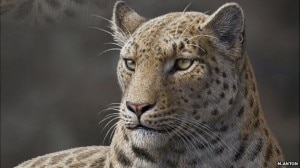Big cats evolved in Asia instead of Africa, fossilists reveal
KATHMANDU, Nepal-The oldest big cat fossils excavated in the Himalayas have supported the belief that big cats were originated in central Asia instead of Africa and later spread throughout the world, a thorough study by an expedition team revealed.
A team of US and Chinese fossilists led by Dr. Tseng and his spouse Juan Liu excavated the new fossils during an expedition in 2010 in the remote Zanda Basin in southwestern Tibet.
Fossilists had discovered over 100 bones- largely perfect remains of a big cat skull- deposited by a river eroding out of cliff.
The skull fragments of the newly-named Panthera Blytheae are supposed to date back to 4.1 million years ago, according to BBC.
According to Royal Society journal Proceeding B, both the Anatomic and DNA reference were applied to ascertain that the skulls belonged to an extinct big cat, whose territorial dominion seems to coincide with many of the species we know today.
‘This cat is a sister of living snow leopards – it has a broad forehead and a short face. But it’s a little smaller – the size of clouded leopards,’ said lead author Dr Jack Tseng of the University of Southern California adding this associations replied a lot of queries scientist had on how these animals originated and spread other boundaries.
‘Biologists had hypothesised that big cats originated in Asia. But there was a division between the DNA data and the fossil record’, BBC quoted Dr. Jack as saying.
DNA evidence suggests they varied from their first cousin the Felinae – which includes cougars, lynxes, and domestic cats – about 6.37 million years ago.
‘We are very astonished to find a cat fossil in that basin,’ Dr Tseng told BBC News, ‘usually we find antelopes and rhinos, but this site was special. We found multiple carnivores – badgers, weasels and foxes.’


